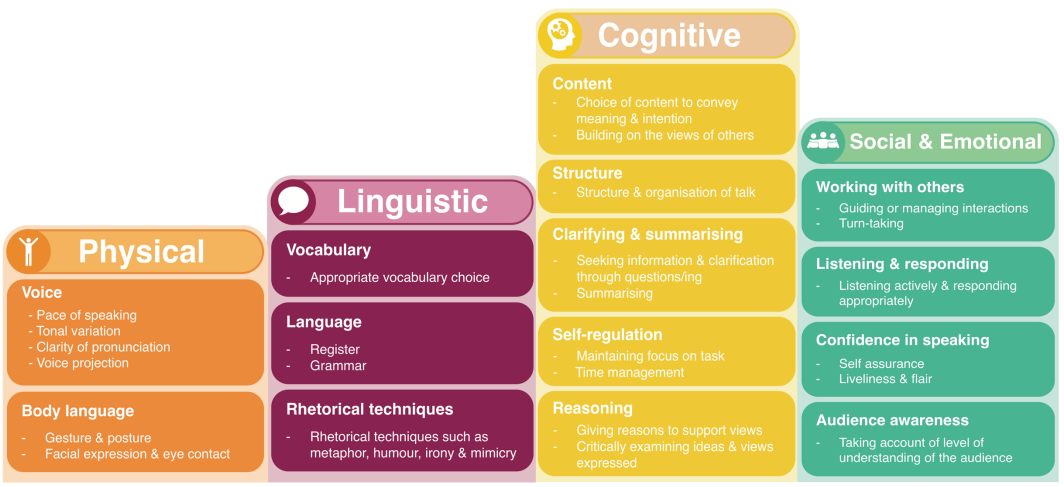Oracy
What Is Oracy?
Oracy is the ability to articulate ideas, develop understanding and engage with others through spoken language. Oracy develops students' confidence, articulacy and capacity to learn.’ Voice 21.
Oracy is…
- Engaging with others ideas
- Reasoning together
- Listening to understand
- Changing people’s minds
- Telling compelling stories
- Developing arguments
- Expressing yourself
- Speaking up for what you believe in
Intent
At St. Herbert’s CE Primary and Nursery School we believe spoken language to be fundamental to the achievement of our pupils. With this at the heart of our curriculum, we are committed to building and embedding a culture of oracy. At the heart of good oracy is the dialogic classroom where purposeful talk is used to drive learning, which has been planned, designed, modelled, scaffolded and structured to enable all learners to develop the skills needed to talk effectively and with confidence. We also strive to develop oracy in the hidden curriculum, playtimes and lunchtimes, and extra-curricular activities; this encompasses the whole ethos of the school.
The deliberate, explicit and systematic teaching of oracy across the phases and throughout the curriculum supports children to make progress in the four strands of oracy. Providing a high quality oracy education empowers every child at St. Herbert’s Primary School to find their voice for success; effective communication skills are needed for students to succeed in their future.
Our aim is to remove communication barriers and enable students to be confident and effective communicators at the end of primary school. Research has found that good oracy leads to higher order thinking and deeper understanding, so we strive as a school to elevate spoken language to provide the solid foundations of reading and writing.
At St. Herbert’s Primary and Nursery School our aim for oracy is to enable children to:
- Speak with confidence, clarity and eloquence.
- Recognise the importance of listening and learn to be an active listener.
- Be confident in the value of their own opinions and have the ability to express them.
- Have a bank of vocabulary they are able to use for different purposes.
- Sustain a logical argument, question, reason and respond to others appropriately.
- Be open-minded, to respect the contribution of others and to take account of their views.
- Share their learning in an engaging, informative way through presentations, showcases, drama, poetry and debate.
Respectful and productive relationships between all who form part of the St. Herbert’s community are crucial aspects of this ethos. As a staff, we therefore foster good communication amongst ourselves and with our pupils, parents and carers, and with the wider community. We place a high priority on supporting the development of good speaking and listening skills amongst our pupils.
Implementation
We ensure that all children have the opportunity to develop and learn spoken language as outlined in the National Curriculum.
Spoken Language for Year 1 to 6 Pupils should be taught to:
- listen and respond appropriately to adults and their peers
- ask relevant questions to extend their understanding and knowledge
- use relevant strategies to build their vocabulary
- articulate and justify answers, arguments and opinions
- give well-structured descriptions, explanations and narratives for different purposes, including for expressing feelings
- maintain attention and participate actively in collaborative conversations, staying on topic and initiating and responding to comments
- use spoken language to develop understanding through speculating, hypothesising, imagining and exploring ideas
- speak audibly and fluently with an increasing command of Standard English
- participate in discussions, presentations, performances, role play/improvisations and debates
- gain, maintain and monitor the interest of the listener(s)
- consider and evaluate different viewpoints, attending to and building on the contributions of others
- select and use appropriate registers for effective communication.
Oracy Framework and Toolkit
The Oracy Framework outlines the elements which underpin successful communication skills and provides a useful tool for analysing speech. The Framework enables students and teachers to understand what effective communication looks like and to put strategies in place to improve specific speaking and listening skills. At St. Herbert’s we implement the Oracy Framework developed by Cambridge University and School 21 which breaks down oracy into 4 distinct strands:
- Physical – how we communicate using our body and voice
- Cognitive – concentration when speaking and listening, asking questions and explaining
- Linguistic – structure of spoken language and vocabulary choices
- Social & Emotional – working with others, listening and responding and developing confidence

At St. Herbert’s staff and pupils follow a progression ladder for oracy across school from EYFS to Year 6. The ladder incorporates the four strands of the oracy framework for each phase (see Oracy Progression PDF).
